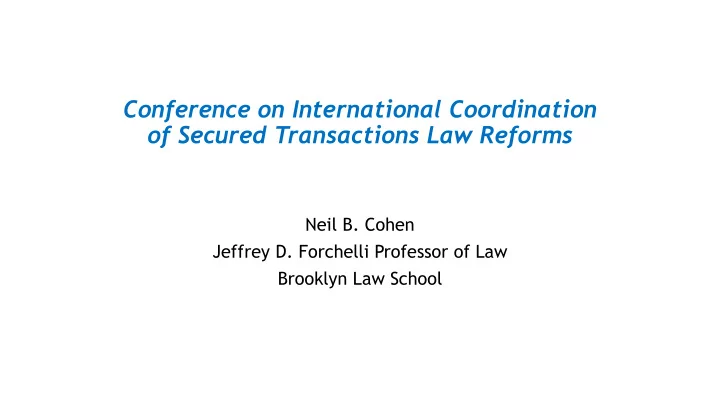

Conference on International Coordination of Secured Transactions Law Reforms Neil B. Cohen Jeffrey D. Forchelli Professor of Law Brooklyn Law School
What I Have Learned About International Secured Transactions Law Reform (mostly the hard way) • Different challenges in creating consensus as to big-picture points and in drafting detail-level exposition in semi- diplomatic setting • Impediments to success of top-down reform. • Well-drafted instruments are not enough
Three Recent Stages of International Secured Transactions Reform • Early stage (1990s), exemplified by United Nations Convention on the Assignment of Receivables in International Trade • Heated debate, limited consensus, some substantive rules but greatest value added by clear choice of law rules • Middle stage (2000s), exemplified by UNCITRAL Legislative Guide on Secured Transactions • Broader scope, more comprehensive, more agreement on broad outlines • Still forceful disagreement on some issues • Recommendations include significant detail • Late stage (2010s), exemplified by UNCITRAL Model Law • High degree of consensus on broad outlines • Detail-level debates primarily among States with existing expertise and minimal need for reform
Lesson One – Creation of an International Instrument • Creation of broad-focused instruments requires both consensus as to big-picture points and agreement as to exposition of detail-level rules. • These tasks involve entirely different dynamics and skills; the same actors not necessarily equally proficient in both. • Advisability of distinguishing between details that are essential for a statute or other instrument to work as intended and those that satisfy the need for an answer, but do not require a particular answer • Soft law is easier to create than hard law. • Desirability of reform ≠ desire for disruptive reform.
Lesson Two – Some Limitations on Top-Down Reform • Sources of desire for reform play a large role in its success. • In a State with active secured credit markets, and lenders who are seeking to engage in economically useful transactions not supported by current law, reforms will have significant traction. • In a State seeking to improve ranking or otherwise improve credit climate by use of a “magic bullet,” law reform alone is probably insufficient to achieve its goals: • The vitamin approach (“take this, it’s good for you”) rarely succeeds. • Incentive of actors who benefit from the status quo to resist reform is likely greater than the incentive of those who might benefit from reform to support it.
Lesson Three – Good Law is not Enough • High quality instruments are necessary for good secured transactions reform but are not sufficient: • A good statute is like a good set of carpenters’ tools. They work best when used by trained professionals, less useful for those without capacity to use them. • Capacity-building takes time. Frustration over failure of new law to generate results quickly does not. • Overly cautious regulators can present a significant impediment to achieving goals of secured transactions reform.
More Attention Needed … • Coordination among international actors is essential • UNCITRAL, Unidroit, Hague Conference have made significant progress in this area, but multiplicity of instruments can be confusing to States • Coordination and quality control of drafting consultants is important • Idiosyncratic drafting choices can impact both harmonization and internal coherence • Adjustment of models to local needs is critical, but drafting implementation can easily lead to unintended side effects
Conclusion • Success in secured transactions law reform requires more than creating a good instrument • Law reform is not a journey for the faint-hearted • The benefits of reform are substantial and well worth the effort
Recommend
More recommend